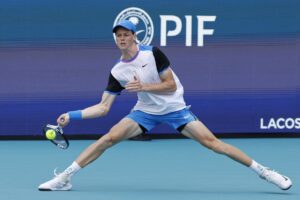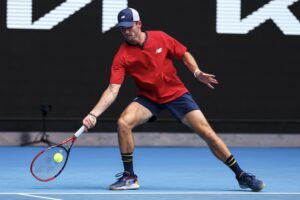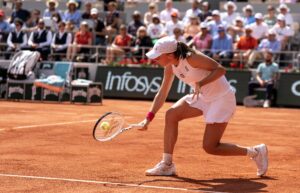Marathon final sets are clearly an endangered species. Wimbledon’s announcement last week that it will follow the lead of the US Open and introduce a tiebreak for the final set in a match (although, unlike the US Open, a fifth-set tiebreak at Wimbledon will only come at 12-12) will surely increase the pressure on the other two Majors – the French Open and the Australian Open – to follow suit. And if all the Majors introduce final set tiebreaks, then the marathon final set will definitely be a thing of the past.
Although having a final set decider undoubtedly makes sense, as it spares players from the kind of physical rigours that make it impossible for them to compete properly in any ensuing match, it does mean that the extraordinarily long and extraordinarily competitive final sets that have been an integral part of tennis history will be gone forever.
Here, then, are the five finest marathon final sets. (And no, they don’t all feature John Isner.)
-
Paul-Henri Mathieu defeats John Isner 18-16 in the second round of the 2012 French Open
Since Wimbledon made its historic announcement last week, John Isner has repeatedly joked that it should be called “the Isner rule.” Joking aside, he has a point, as he features in no fewer than three of the five titanic final sets on this list. And it is not just at Wimbledon that he is capable of going long – very long – as he has also fought out a magnificent fifth set at the French Open. It was in the second round in 2012, when Isner faced France’s own Paul-Henri Mathieu and ultimately lost 18-16 in the fifth and final set.
That final sets can go on seemingly forever at Wimbledon is perhaps not so surprising, as serving is more important on grass than on any other surface. Clay is arguably the surface that serving is least important on, as the red dirt “grips” the ball and consequently makes it harder for a player to generate pace, even on serve. Consequently, it was extremely impressive that Mathieu, who is not known as a big server, finally won out against Isner, who is one of the finest and fastest servers in the game. However, it was no surprise at all that Mathieu should then lose his next match, against Marcel Granollers of Spain. The only surprise was that he somehow took Granollers to a final set in that match, before finally capitulating 6-1 in the fifth.
-
Ivo Karlovic defeats Horacio Zeballos 22-20 in the first round of the 2017 Australian Open
Like Isner, Croatia’s Ivo Karlovic is one of the biggest servers in men’s tennis and like most big servers he has always struggled to return, especially with the one-handed backhand that has always been his weakest shot. Consequently, it is not remotely surprising that he should feature somewhere on this list of marathon final sets, because a player like Karlovic, who has a huge first serve but a comparatively weak return of serve, is always likely to find themselves in tie-breaks at the end of a set.
By contrast, Argentina’s Horacio Zeballos is, like most of his countrymen and women, a clay court specialist. Indeed, he is so good on clay that he is one of only four players to have beaten Rafael Nadal in a clay court final (the 2013 VTR Open in Chile). Given that the other three players to have accomplished that feat are Roger Federer, Novak Djokovic and Andy Murray, Zeballos’s clay-court credentials are undoubtedly impressive.
However, it was neither on the grass of Wimbledon nor the clay of Paris that Karlovic and Zeballas fought out their own marathon final set at a Major. Instead, it was on the blue Plexicushion of Melbourne, where their first round match finally ended 22-20 in the fifth, after Karlovic had finally broken Zeballos for the final time. Unlike most of the marathon runners on this list, Karlovic actually won his next match, against Australia’s Andrew Whittington, before fatigue finally caught up with him and he lost his third round match against David Goffin in straight sets.
-
Roger Federer defeats Andy Roddick 16-14 in the 2009 Wimbledon Men’s Singles Final
Purely on number of games (a mere 30), this could have been bottom of the list. However, the fact that it was a marathon final set played out in a Major Final means that it could also have been top of the list. In the end, putting it in the all-time top three seems a suitable compromise.
Of course, the 2009 Wimbledon Men’s Singles Final was not any old Wimbledon Men’s Singles Final, but one that would be truly historic if Roger Federer won, as it would take him past Pete Sampras’s men’s Major record of 14 singles titles and establish him, statistically at least, as the greatest male tennis player ever. As a result, three of his fellow greats of the game – Rod Laver, Bjorn Borg and Sampras himself – gathered to see history being made.
Perhaps the pressure or the expectation got to even the famously unflappable Federer, as Roddick put up by far his finest performance in the three Wimbledon finals that he played against the Swiss. Certainly Roddick gave one of the finest ever serving displays, especially in a Major Final. He was actually unbreakable until the very last game of the match, when Federer finally broke him and in the process overtook his own idol, Sampras, on the all-time Majors list.
-
Kevin Anderson defeats John Isner 26-24 in the 2018 Wimbledon Men’s Singles semi-final
And so, inevitably, we return to the John Isner show, as he holds not only the top spot on this list but the top two spots. That is surely the most eloquent testament to his extraordinary serving power and it is also ultimately the reason why Wimbledon changed its rules last week. Quite simply, once an Isner Wimbledon final set ultra-marathon began, it didn’t really matter who won or lost, because the winner would almost certainly lose their next match after their Herculean exertions.
That was certainly the case at Wimbledon this year, where Kevin Anderson finally broke Isner in the 49th game of a fifth set that lasted nearly three hours, before serving out for the match. And even though Novak Djokovic actually had to complete his semi-final against Rafael Nadal the following day, because the Isner-Anderson match had gone on for so long, Djokovic was still daisy-fresh in comparison to Anderson when they faced each other in the Final. Indeed, an exhausted Anderson was arguably the ideal opponent for Djokovic to face in his first Major Final since he had claimed the career Grand Slam at the 2016 French Open and then begun his long spiral down into injury and relative insignificance.
-
John Isner defeats Nicolas Mahut 70-68 in the 2010 Wimbledon First Round
70-68 in the fifth. Like Brazil’s 7-1 defeat to Germany in the 2014 World Cup semi-final, it is one of those sporting scorelines that is scarcely believable. Indeed, it was so apparently unbelievable that within a few days of Isner’s epic triumph his remarkable display of staying power was being held up by players and coaches of other sports, including the famously physical and attritional sport of American football (or gridiron), as some kind of litmus test of sporting stamina and strength.
In the future, it is entirely possible that epic novels, or operas (or even opera cycles), will be written about Isner’s eventual defeat of Mahut. There is certainly the raw material for such enormous artistic achievements, as the match lasted for a total of 11 hours and five minutes and took a total of three days to complete. Perhaps the most incredible statistic of all is that the final set alone lasted for more than eight hours.
Of course, Isner could hardly walk afterwards, let alone play tennis, and so he lost his next match to Holland’s Thiemo de Bakker in straight sets; in fact, he was even bagelled in the first set, before recovering sufficiently to win a total of five games in the next two sets. But of course that is ultimately irrelevant. In this epic match, which is undoubtedly the most famous first round match at any Major in tennis history, Isner first showed the indefatigable fighting spirit that would become his trademark. And that spirit, as was proved last week, would ultimately change the course of tennis history.






